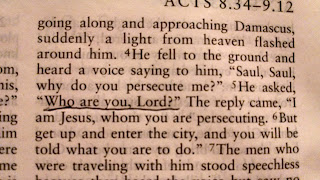Observation: Revelation is weird. It's meant to be. It's chock full of images that would have made sense as code language to other first century Jews, but some of it is still weird. I think one big mistake we make reading apocalyptic literature, is to assume its authors had some hobby-horse to ride, some hidden message to tuck into every verse. That may often be the case. Sometimes, however, it's entirely possible even the authors didn't have any clue exactly what they were looking at, and they made their best attempt to describe it. If it's really from God, why would we assume we can understand it all?
Application: An image that sticks with me here is of a scroll that's sweet at first, but makes you feel queasy later. That's God's word to a "T". Sure, loving one another sounds great. But after the hundredth time THIS MORNING that my son rebels against the most basic getting ready for school things that he does every day, that love doesn't always sit well. Forgiveness tastes really sweet when it's a brother or sister forgiving us, but it leaves you a bit seasick when it's time to forgive another. God's grace is an awesome concept, but actually accepting that I'm a sinner who needs it, all the time, every day, without any hope of earning even a fraction of it...that gets my gut churning.
God's word may be sweet sometimes, but the more reflect on what it actually means for our lives, the more it unsettles our stomachs, and our lives. Thankfully, when it gets to be too much, Jesus is right there with the Gatorade.
Prayer: God, thanks for your word, which unsettles in us that which should not be settled. Amen.























